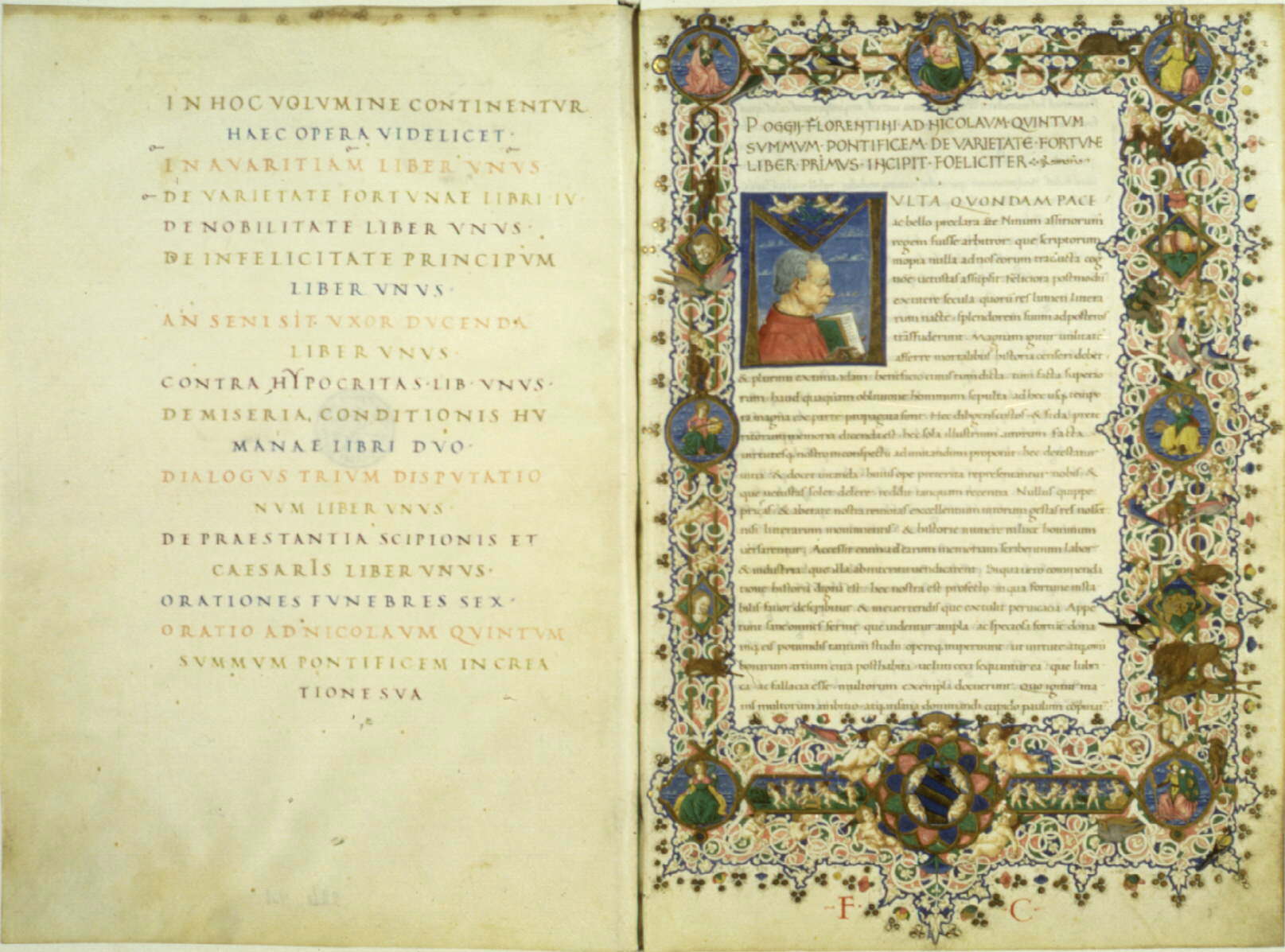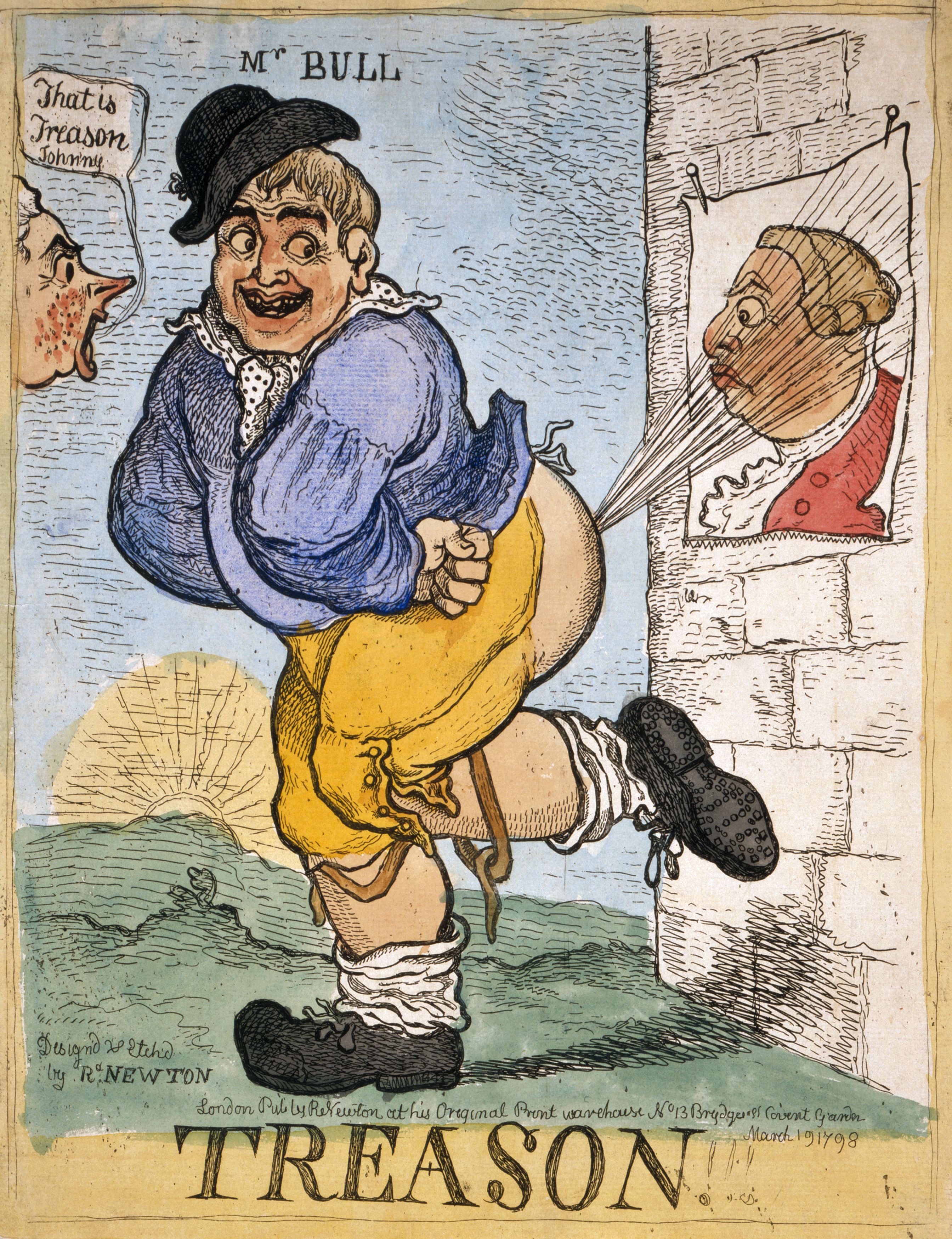|
Facetiae
The ''Facetiae'' is an anthology of jokes by Poggio Bracciolini (1380–1459), first published in 1470. It was the first printed joke book. The collection, "the most famous jokebook of the Renaissance", is notable for its inclusion of scatological jokes and tales, six of the tales involving flatulation humor and six involving defecation. Printing history Early editions of the ''Facetiae'' are rare, and they are not yet described in an organized fashion as is common for ''incunabula''. It was, evidently, very popular: an 1894 bibliography lists twenty editions from the fifteenth century, and states that the oldest is printed by Georgius Lauer in Rome and is known as Hain 13179 (a quarto with 110 leaves). The second oldest is called Reichling 1919 (100 leaves). The 100-leaf edition, despite having been described elsewhere as the first printing, is now generally held to be later than the 110-leaf edition, which is traditionally thought to be the editio princeps; both were printed ... [...More Info...] [...Related Items...] OR: [Wikipedia] [Google] [Baidu] |
Poggio Bracciolini
Gian Francesco Poggio Bracciolini (; 11 February 1380 – 30 October 1459), usually referred to simply as Poggio Bracciolini, was an Italian scholar and an early Renaissance humanism, Renaissance humanist. He is noted for rediscovering and recovering many Classics, classical Latin manuscripts, mostly decaying and forgotten in German, Swiss, and French monastery, monastic libraries. His most celebrated finds are ''De rerum natura'', the only surviving work by Lucretius, ''De architectura'' by Vitruvius, lost orations by Cicero such as ''Pro Roscio Amerino, Pro Sexto Roscio'', Quintilian's ''Institutio Oratoria'', Statius' ''Silvae'', Ammianus Marcellinus' ''Res Gestae'' (''Rerum gestarum Libri XXXI''), and Silius Italicus's ''Punica (poem), Punica'', as well as works by several minor authors such as Frontinus' ''De aquaeductu'', Nonius Marcellus, Marcus Valerius Probus, Probus, Flavius Caper, and Eutyches. Birth and education Poggio di Guccio (the surname Bracciolini added during ... [...More Info...] [...Related Items...] OR: [Wikipedia] [Google] [Baidu] |
Georgius Lauer
Georgius Lauer was a German printer who worked in Rome in the late fifteenth century, responsible for important publications by classical authors and renaissance humanists, including editiones principes by Festus, Nonius, Varro, Poggio Bracciolini, and others, as well as patristic writers such as John Chrysostom. Publications * Curtius, ''Historiae Alexandri Magni'' (c. 1470) * Festus, ''De verborum significatu'' (''editio princeps'', 1470/1471) * Lucian (1470) * Nonius, ''De compendiosa doctrina'' (''editio princeps'', 1470) * Poggio, ''Facetiae'' (1470/1471) * Varro Marcus Terentius Varro (116–27 BCE) was a Roman polymath and a prolific author. He is regarded as ancient Rome's greatest scholar, and was described by Petrarch as "the third great light of Rome" (after Virgil and Cicero). He is sometimes call ..., ''De lingua latina'' (''editio princeps'', 1471/1472) * Johannes Chrysostomus, ''Homiliae super Johannem'' ( F. Griffolini trans.) (1470) * Johannes Chrysos ... [...More Info...] [...Related Items...] OR: [Wikipedia] [Google] [Baidu] |
Flatulence Humor
Flatulence humor (more commonly known as fart jokes) is a form of toilet humor that refers to flatulence. It can take the form of to any type of joke, practical joke device, or other off-color humor . History Although it is likely that flatulence humor has long been considered funny in cultures that consider the public passing of gas impolite, such jokes are rarely recorded. It has been suggested that one of the oldest recorded jokes was a flatulence joke from the Sumerians that has been dated to 1,900 BC. Two important early texts are the 5th century BC plays ''The Knights'' and ''The Clouds'', both by Aristophanes, which contain numerous fart jokes. Another example from classical times appeared in ''Apocolocyntosis'' or ''The Pumpkinification of Claudius'', a satire attributed to Seneca the Younger, Seneca on the late Roman emperor: He later explains he got to the afterlife with a quote from Homer: "Breezes wafted me from Ilion unto the Ciconian land." Archeologist Warwi ... [...More Info...] [...Related Items...] OR: [Wikipedia] [Google] [Baidu] |
Christophorus Valdarfer
Christophorus Valdarfer was an early printer, active in Venice and Milan Milan ( , , ; ) is a city in northern Italy, regional capital of Lombardy, the largest city in Italy by urban area and the List of cities in Italy, second-most-populous city proper in Italy after Rome. The city proper has a population of nea ... in the second half of the fifteenth century. References 15th-century printers Italian printers {{printmaker-stub ... [...More Info...] [...Related Items...] OR: [Wikipedia] [Google] [Baidu] |
Andreas Belfortis
Andreas Belfortis was an early printer, active in Ferrara Ferrara (; ; ) is a city and ''comune'' (municipality) in Emilia-Romagna, Northern Italy, capital of the province of Ferrara. it had 132,009 inhabitants. It is situated northeast of Bologna, on the Po di Volano, a branch channel of the main ... in the second half of the fifteenth century. References Italian printers {{italy-business-bio-stub ... [...More Info...] [...Related Items...] OR: [Wikipedia] [Google] [Baidu] |
Joke Books
A joke is a display of humour in which words are used within a specific and well-defined narrative structure to make people laugh and is usually not meant to be interpreted literally. It usually takes the form of a story, often with dialogue, and ends in a punch line, whereby the humorous element of the story is revealed; this can be done using a pun or other type of word play, irony or sarcasm, logical incompatibility, hyperbole, or other means. Linguist Robert Hetzron offers the definition: It is generally held that jokes benefit from brevity, containing no more detail than is needed to set the scene for the punchline at the end. In the case of riddle jokes or one-liners, the setting is implicitly understood, leaving only the dialogue and punchline to be verbalised. However, subverting these and other common guidelines can also be a source of humour—the shaggy dog story is an example of an anti-joke; although presented as a joke, it contains a long drawn-out narrative of ... [...More Info...] [...Related Items...] OR: [Wikipedia] [Google] [Baidu] |
Incunable
An incunable or incunabulum (: incunables or incunabula, respectively) is a book, pamphlet, or broadside that was printed in the earliest stages of printing in Europe, up to the year 1500. The specific date is essentially arbitrary, but the number of printed book editions exploded in the following century, so that all incunabula, produced before the printing press became widespread in Europe, are rare, where even some early 16th-century books are relatively common. They are distinct from manuscripts, which are documents written by hand. Some authorities on the history of printing include block books from the same time period as incunabula, whereas others limit the term to works printed using movable type. there are about 30,000 distinct incunable editions known. The probable number of surviving individual copies is much higher, estimated at 125,000 in Germany alone. Through statistical analysis, it is estimated that the number of lost editions is at least 20,000. Aro ... [...More Info...] [...Related Items...] OR: [Wikipedia] [Google] [Baidu] |
Ludwig Hain
Ludwig Friedrich Theodor Hain (5 July 1781, in Stargard – 27 June 1836, in Munich) was a German editor and bibliographer. He studied classical philology and Oriental studies, Oriental languages at the University of Halle, and from 1802 lived and worked in Weimar. For several years he was an editor of Brockhaus Enzyklopädie, Brockhaus' ''Conversations-Lexikon'' in Altenburg (from 1812) and Leipzig. Later on in his career, he worked as private scholar in Munich. at Allgemeine Deutsche Biographie He is best known as the compiler of ''Repertorium bibliographicum'' (1822), a pioneering short title catalogue of incunabula. "Hain numbers" are still used as common bibliographical references. [...More Info...] [...Related Items...] OR: [Wikipedia] [Google] [Baidu] |
Quarto
Quarto (abbreviated Qto, 4to or 4º) is the format of a book or pamphlet produced from full sheets printed with eight pages of text, four to a side, then folded twice to produce four leaves. The leaves are then trimmed along the folds to produce eight book pages. Each printed page presents as one-fourth size of the full sheet. The earliest known European printed book is a quarto, the '' Sibyllenbuch'', believed to have been printed by Johannes Gutenberg in 1452–53, before the Gutenberg Bible, surviving only as a fragment. Quarto is also used as a general description of size of books that are about 12 inches (30 cm) tall, and as such does not necessarily indicate the actual printing format of the books, which may even be unknown, as is the case for many modern books. These terms are discussed in greater detail in book sizes. Quarto as format A quarto (from Latin , ablative form of , fourth) is a book or pamphlet made up of one or more full sheets of paper on which eight pag ... [...More Info...] [...Related Items...] OR: [Wikipedia] [Google] [Baidu] |
Editio Princeps
In Textual scholarship, textual and classical scholarship, the ''editio princeps'' (plural: ''editiones principes'') of a work is the first printed edition of the work, that previously had existed only in manuscripts. These had to be copied by hand in order to circulate. For example, the ''editio princeps'' of Homer is that of Demetrios Chalkokondyles, Demetrius Chalcondyles, now thought to be from 1488. The most important texts of classical Greek and Roman authors were for the most part produced in ''editiones principes'' in the years from 1465 to 1525, following the invention of the printing press around 1440.Briggs, Asa & Burke, Peter (2002) ''A Social History of the Media: from Gutenberg to the Internet'', Cambridge: Polity, pp. 15–23, 61–73. In some cases there were possibilities of partial publication, of publication first in translation (for example from Greek to Latin), and of a usage that simply equates with first edition. For a work with several strands of manuscrip ... [...More Info...] [...Related Items...] OR: [Wikipedia] [Google] [Baidu] |
Lotte Hellinga
Lotte Hellinga, FBA (née Querido, born 1932) is a book historian and expert in early printing. She is an authority on the work of William Caxton. Early life Lotte Hellinga was born in 1932. She studied at the University of Amsterdam under Wytze Hellinga who became her husband in 1973. Career Hellinga was a senior lecturer at the University of Amsterdam from 1967 to 1976, and General Secretary of the Consortium of European research libraries from 1992 to 2002. Formerly she was deputy keeper of the British Library. In 1989 she was awarded the Gutenberg Prize of the International Gutenberg Society and the City of Mainz. Hellinga was elected a corresponding member of the Royal Netherlands Academy of Arts and Sciences in 1986. In 1990, she was elected a fellow of the British Academy, and from 1991 to 1994, was a member of its Council. She is an expert in the work of the fifteenth-century printer William Caxton. Selected publications * ''The Fifteenth-Century Printing Types of ... [...More Info...] [...Related Items...] OR: [Wikipedia] [Google] [Baidu] |
Modern Humanities Research Association
The Modern Humanities Research Association (MHRA) is a United Kingdom–based international organisation that aims to encourage and promote advanced study and research of humanities. It is most notable for producing the '' MHRA Style Guide''. History The MHRA was founded in 1918 in Christ's College, Cambridge. After an early change of name to MHRA in 1918, the unincorporated charity became an incorporated company with the same name on 2 October 1997. Its declared aim is to encourage and promote advanced study and research in the field of the modern humanities, which include the modern and medieval European languages, literatures and cultures. The current chair of the MHRA is Professor Derek Connon of Swansea University. Publications As well as the ''MHRA Style Guide'', the MHRA publishes six scholarly journals: * '' Annual Bibliography of English Language and Literature'' * '' The Modern Language Review'' * '' Austrian Studies'' * '' Portuguese Studies'' * '' The Slavonic and E ... [...More Info...] [...Related Items...] OR: [Wikipedia] [Google] [Baidu] |



